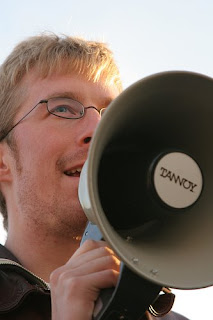
"Death is not the biggest fear we have; our biggest fear is taking the risk to be alive -- the risk to be alive and express what we really are."
--Don Miguel Ruiz
Photo by roland.
Serenity comes from focusing on what you can control and letting go that which you can't. Here's how to apply that to business.


If you're a freelancer interested in long-form narrative, check out his archive and try an exercise:[To make it,] I think it takes relentlessness. When I’m starting to work on a story, I’ll start reading about something, and I’ll just follow every link, and as I’m doing it I’ll make a list in a Word document of the people that I need to find.
I start calling them immediately, and talking to them and taking notes on my computer. The expression I use with Margaret is “I had a red dog day today,” which means I had my nose down on the ground and I was going after everything today. Just hoovering in enormous amounts of information. And when I start a proposal, I try to have a series of red dog days where I am just relentless, going after everybody, and as soon as I encounter somebody’s name I pick up the phone and I call. When I finish the interview I say, Who else should I talk to? Then I call those people.
I don’t put it off — I don’t say these are people I’m going to call later — I do it right then. Man, there are times when in one day I can get enough information to write a proposal that will get me a $12,000 magazine assignment.
You throw the ball when you take an idea and toss it onto the page. You throw the ball when you edit this work and renew it, and again when you show it to someone else, and again when it bounces out and back to various publications, agents, editors. You throw the ball when you blog, too, or comment on a blog. It’s a handy little game of catch, not the World Series, but a friendly back and forth while you chat about what is going on in your life.Finally, let's be honest: Being a freelancer right now is scary. But you can't let the fear stop you from marketing. Consider Linda Formichelli's great post on the Renegade Writer blog that details six ways to eliminate the fear, or at least manage it. Some may look familiar to readers of this blog.